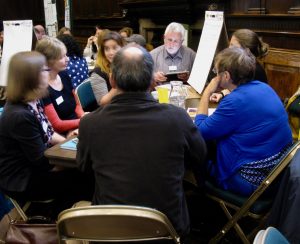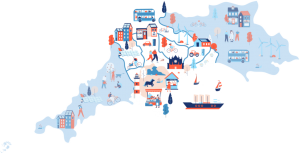Investigating Perceptions of the Devon Net Zero Citizen’s Assembly Process
(ESRC IAA Grant Jan-Dec 2020)
Developing lessons and sharing best practices on Online Public Deliberation
(ESRC IAA Grant Feb-Dec 2021)
This project page covers two grants, which together form a related package of work focused on the use of Citizen’s Assemblies and Online Deliberation on Climate Change.
Background
Rapid and extensive action on climate change is necessary to prevent hazardous outcomes for societies and communities across the world (IPCC, 2018). More than 290 councils across the UK have declared a Climate Emergency, including Devon County Council in February 2019 (ClimateEmergencyUK 2020)[1]. Citizens’ Assemblies, as well as other deliberative public engagement processes like Citizens Juries, are increasingly being seen as useful methods for facilitating public input into discussions about how to tackle this emergency.
For example, these processes can help road test public responses to different types of policies and can also allow citizens to generate new policy priorities. While the Devon County Council has committed to holding a Citizens’ Assembly, under the auspices of the Devon Climate Emergency Response Group (a county-wide network of public, private and civil society organisations), there is a lack of knowledge and understanding about how to take this agenda forward in ways that are considered legitimate, acceptable, inclusive and fair.
Project Aims
The first part of our project, stemming from the first grant (Jan-Dec 2020) provides a targeted, multi-stakeholder analysis of the value of public deliberation on climate change. Findings are co-created in partnership with Devon County Council and the Devon Climate Emergency Response Group. Our aim is to provide evidence about how a variety of stakeholders and members of the public view the citizen’s assembly process, including perceptions about its purpose, operational aspects and potential strengths and weaknesses. The research aims to generate insights for use by local stakeholders, notably Devon Climate Emergency Response Group (DCERG) when undertaking the Citizens’ Assembly itself (which owing to Covid-19, is taking place online). In particular, the research seeks to generate insights about communicating with the public, about aspirations and concerns, and about maximising the credibility, impact and perceived legitimacy of the Assembly in the eyes of the public and key stakeholders. The research also contributes to broader debates about the nature and scope of public participation within climate science and policy.
This part of the research employs a mixed methods research approach including interviews with key stakeholders who are part of the Devon Climate Emergency process, and a survey with public stakeholders who provided evidence to the carbon plan public consultation in 2019.
The second part of our project, stemming from the second grant (Feb-Dec 2021), focuses on learning lessons and disseminating best practices regarding online deliberation. The project addresses the following core aims:
- To impact on the evolving design of the Devon Online Citizens Assembly in order to support the development of DCC/DCERG Devon pathways to Net Zero process.
- To gather critical reflections from participants and practitioners involved in the Online Citizens Assembly.
- To co-design and co-produce with partners a toolkit on online and digital methods for deliberative democratic processes.
- To collaborate with leading national organisations to lead webinars on the running of online Mini-Publics.
The projects are funded by grants from the Economic and Social Research Council Impact Acceleration Account (IAA), with financial and in-kind contributions from Devon County Council.
Project Team:
Professor Patrick Devine-Wright (Project Principal Investigator, University of Exeter, Geography)
Dr Alice Moseley (Project Co-Investigator, University of Exeter, Dept of Politics)
Dr Rebecca Sandover (Project Co-Investigator, University of Exeter, Geography)
Dr Fionnguala Sherry-Brennan, Project Research Fellow, University of Exeter, Geography
Mr Doug Eltham (Climate Change Lead, Devon County Council)

Project Advisory Board:
Professor Rebecca Willis, Professor in Practice -Lancaster University
Professor Graham Smith, Professor of Politics -University of Westminster
Professor John Barry, Professor of Green Political Economy -Queen’s University, Belfast
Professor Dr. Petra Schweizer-Ries, Professor of Sustainability – Bochum University of Applied Sciences
Professor Peta Ashworth, Chair in Sustainable Energy Futures- The University of Queensland
Professor David Farrell, Professor of Politics -University College Dublin
Project Partners:
DCERG – On 22nd May 2019 public, private and voluntary organisations from across Devon came together to form the Devon Climate Emergency Response Group, to declare a climate and ecological emergency and to endorse the principles of the Devon Climate Declaration. This recognises that we are aware of the significant implications of climate change for Devon’s communities and commits the signatories to work together on developing a Devon Carbon Plan, which is being developed by the Net-Zero Task Force. Emily Reed (Climate Emergency Project Manager, Devon County Council) is our contact for the research project and is managing the wider DCE process.

For more information on Citizens’ Assemblies in the UK see: Involve UK’s public participation charity who are leading the delivery of the Climate Assembly UK
and Climate Assembly UK the Parliamentary Select Committees’ public deliberation process which has been exploring in 2020 how the UK can reduce greenhouse gas emissions to net zero by 2050.
[1] https://www.climateemergency.uk/blog/list-of-councils/

